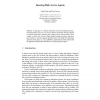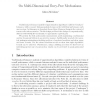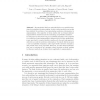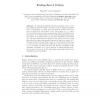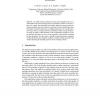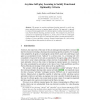120
Voted
ALDT
2009
Springer
15 years 8 months ago
2009
Springer
Abstract. In this paper we explicitly model risk aversion in multiagent interactions. We propose an insurance mechanism that be can used by risk-averse agents to mitigate against r...
123
click to vote
ALDT
2009
Springer
15 years 8 months ago
2009
Springer
Aggregating preferences for finding a consensus between several agents is an important issue in many fields, like economics, decision theory and artificial intelligence. In this...
108
click to vote
ALDT
2009
Springer
15 years 8 months ago
2009
Springer
Traditional performance analysis of approximation algorithms considers overall performance, while economic fairness analysis focuses on the individual performance each user receiv...
138
click to vote
ALDT
2009
Springer
15 years 8 months ago
2009
Springer
This paper is devoted to sequential decision problems with imprecise probabilities. We study the problem of determining an optimal strategy according to the Hurwicz criterion in de...
114
click to vote
ALDT
2009
Springer
15 years 8 months ago
2009
Springer
Abstract. Argumentation has been acknowledged as a powerful mechanism for automated decision making. In this context several recent works have studied the problem of accommodating ...
128
click to vote
ALDT
2009
Springer
15 years 8 months ago
2009
Springer
Abstract. An optimal probabilistic-planning algorithm solves a problem, usually modeled by a Markov decision process, by finding its optimal policy. In this paper, we study the k ...
116
click to vote
ALDT
2009
Springer
15 years 8 months ago
2009
Springer
Abstract. The stable marriage problem has many practical applications in twosided markets like those that assign doctors to hospitals, students to schools, or buyers to vendors. Mo...
103
click to vote
ALDT
2009
Springer
15 years 8 months ago
2009
Springer
Abstract. Several schemes have been proposed for compactly representing multiattribute utility functions, yet none seems to achieve the level of success achieved by Bayesian and Ma...
107
click to vote
ALDT
2009
Springer
15 years 8 months ago
2009
Springer
Abstract. We propose various models for lobbying in a probabilistic environment, in which an actor (called “The Lobby”) seeks to influence the voters’ preferences of voting ...
129
click to vote
ALDT
2009
Springer
15 years 8 months ago
2009
Springer
We present an anytime multiagent learning approach to satisfy any given optimality criterion in repeated game self-play. Our approach is opposed to classical learning approaches fo...
